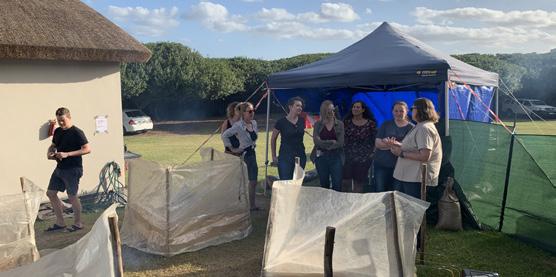
4 minute read
Statement from the director
Postdoc Elizabeth Velliky excavating at Blombos Cave in March 2020.
A lot of water has passed under the SapienCE bridge in 2020. The Covid-19 pandemic has resulted in all our SapienCE scientists having to rethink and adapt their research plans for 2020 and beyond into 2021. There have been some major setbacks, yet despite these unfortunate interruptions I can also report that our swift mitigatory actions resulted in several positive outcomes.
I report first on fieldwork: i) The forced cancellation of our excavation programme at Blombos Cave in March 2020 was unfortunate, but we hope to return in late 2021 or 2022 once we have a firmer idea of travel possibilities; ii) A planned geological survey of the Blombos coastline in April was also cancelled; iii) Better news is that our planned 3-week programme of experimental archaeology carried out in March at Jongensfontein, South Africa, by our Postdocs and PhDs was completed successfully. We expect that several publications will emanate from this innovative research; iv) A planned collection of speleothems at Bloukrans Cave, De Hoop Nature Reserve, was also highly successful, and these samples are now being studied in Bergen. Based on preliminary dating, three speleothems will likely provide high resolution records spanning Marine Isotope Stage 4. Two other samples date back to ~ 80 and ~ 88 thousand years ago (ka) and should provide climatic/environmental context at the time of human occupation at Blombos Cave; v) Our plans to conduct offshore sediment coring from the research vessel, Marion Dufresne, in February/March 2020 were successful and two cores were recovered off the coast near Blombos and Klasies. These cores are now being analysed in Bergen. The basal dates of the cores are estimated to be 240 ka and 120 ka. The climate data we recover will be highly beneficial for our project.
The pandemic resulted in intermittent periods where all our SapienCE scientists worked from home. Despite the lockdown, and the temporary unavailability of laboratories and offices, I can report that most of our research facilities in Bergen are open to a limited extent and planned research is continuing, albeit slowly in some instances. To varying degrees SapienCE research in Bordeaux, Tübingen, Royal Holloway and in our Cape Town laboratory is also continuing. As a team we have also adapted our plans and adopted innovative ways of doing research. I list here some of these actions: i) We have upgraded some key laboratory equipment in Cape Town to enable remote operation of cameras and microscopes from Bergen. For example the Olympus EP50 Microscope Digital Camera can be used to examine and photograph samples via the internet; ii) Our research plans have been revised repeatedly, shifting from a focus on fieldwork to greater laboratory based analysis; iii) We have engaged additional scientific assistants in Bergen and Cape Town to help our PhDs and Postdocs speed up analysis and access curated materials, especially those stored in Cape Town; iv) We have acquired export permits for some of our excavated materials stored in South Africa, and are now analysing those materials in Bergen; v) We have provided support for PhDs and Postdocs applying for contract extensions due to time lost as a result of the pandemic. We have also instituted a new mentorship programme for Postdocs and PhDs so that they have extended career planning assistance from senior SapienCE scientists; vi) Regular seminars and workshops have continued via virtual meetings on Zoom or MS Teams. As a group we have kept in contact with regular bi-monthly Leader Group meetings via Zoom, and bi-monthly Zoom meetings where all our scientists can join in a group chat. Supervision meetings with PhDs and mentorship of Postdocs have also continued via Zoom; vii) Lastly, we have revised our budgets in various categories, especially where large funding amounts remain unspent due to cancelled fieldwork or access to materials.
SapienCE continues to do well with publications, and our researchers have presented at a number of online academic conferences, and delivered popular science lectures. Several major conferences that SapienCE scientists were planning to attend were cancelled, for example SANORD, that was to be held in Bergen, and the Society of Africanist Archaeologists meeting in Oxford. Outreach work, taking our science to the public continues to be effective (ee page 36-43). We have been successful at appointing high quality Postdocs and PhDs, and at attracting external funding. Proposals from world class research groups to collaborate with SapienCE has in fact increased. We expect to conclude several new major collaboration schemes in 2020/2021. Unfortunately, our SapienCE (administrative) manager resigned due to personal reasons in early 2020. We have been fortunate that our SapienCE Postdoc, Dr Silje Evjenth Bentsen, has been hired to fill this post permanently and we extend a warm welcome to her.
I firmly believe that, despite the setbacks caused by the Covid-19 pandemic, SapienCE scientists and administrators are striding ahead, keeping the ship steady and continuing to produce highly innovative and multi-disciplinary science that is truly ground-breaking. We are looking forward to a productive and safe 2021.








